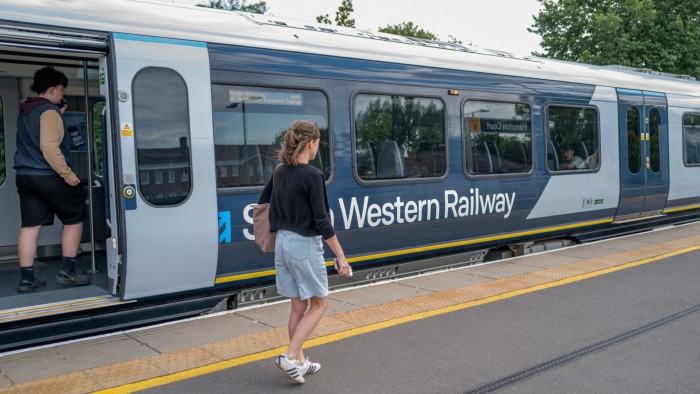Share this @internewscast.com
Emily Davies appeared worried as she stood on the platform at Hampton Court station, within the London commuter zone, uncertain if her train would even set off.
The theatre manager expressed her anger regarding the subpar service provided by South Western Railway, which she found increasingly undependable. She lamented the worsening situation of the route to London Waterloo.
Other passengers shared her sentiment, mere weeks after UK transport secretary Heidi Alexander described the May nationalisation of the South Western operation, following three decades under private control, as a significant achievement.
However, this transition to public management has not resulted in an immediate betterment. On July 28, the new management implemented a temporary “emergency” timetable for a month, reducing numerous services from its regular daily schedule of about 1,600. Occasionally, the line servicing Hampton Court, used daily by thousands, has been cut from two trains per hour to just one.
The issues at South Western have sparked doubts about whether the new public-sector leadership can revamp one of the UK’s busiest rail systems. This operator was the first to shift to public ownership following the general election, under the Labour government’s initiative to reclaim privately managed services as their contracts conclude.
The newly nationalized South Western faces a myriad of challenges, including frequent delays, cancellations, unreliable infrastructure, a shortage of drivers, and issues with the train fleet. C2C, the Essex rail service nationalized last month, along with nine other franchises set to transition in the next two years, encounter similar problems.
Graham Eccles, a retired railway manager with experience of the UK’s privatised train system and the state-run British Rail that preceded it, said many of the problems dated back to the coronavirus pandemic.
A decline in traffic during lockdown forced the scrapping of operators’ franchises and their replacement with management contracts, which restricted operators’ choice about which services to offer and prioritised cost control.
“I’d probably put it down to . . . money not being invested since Covid, not maintaining train crew establishment, not making sure you have enough drivers and guards,” said Eccles.
The Department for Transport, which took over South Western from a consortium of train and bus company FirstGroup and Hong Kong’s MTR, said it was working to address the problems on the service, while warning that progress would be difficult.
“The issues faced by [South Western] passengers are long-standing ones inherited from previous private-sector ownership, and it will take time to root them out,” it said.
At the heart of South Western’s problems is the slow delivery of a fleet of 90 new “Arterio” trains that were meant to enter service six years ago.
The effort under the FirstGroup consortium to bring in the fleet was the “most botched introduction of a new train in living memory”, said Eccles, with delays in building the units compounded by problems with their quality when they were eventually delivered. Disputes with unions over their safe operation added to the delays.
These problems have been exacerbated by driver shortages. One manager at South Western said the FirstGroup consortium, under pressure to save money, minimised the number of drivers employed and introduced schedules that left minimal time to recover if anything went wrong. There was also little time allocated to train drivers on the new Arterios.
“We’ve been experiencing . . . some real scrambles to get all of the driver slots filled,” said the person, speaking on condition of anonymity, adding that continuing to run the existing 40-year-old trains had also proved difficult.
“For the last year, 18 months, we’ve been continually fighting a battle to make sure we have enough trains in the right place,” he said. “That has put a constraint on what we can do to improve customer service and the customer experience.”

At Hampton Court, there was weariness at the continuing problems. Dayana Stander, manager of the station’s Chain 76 café, said she saw the stress in the faces of her customers, who were “never relaxed”.
John Lyons, a regular commuter, complained about paying £15 a day for an unreliable service and has written to local MP Monica Harding to express his frustrations.
“We moved here knowing it was two trains an hour,” said Lyons. “To have that then halved and it being unpredictable — that’s what motivated me to complain.”
Neither he nor the other Hampton Court commuters thought the newly nationalised operation would be improved quickly.
“Only a fool would believe that changing from a state-controlled, privatised railway to a state-controlled railway company is going to change the service overnight,” said Eccles.

The South Western manager maintained that progress was being made, noting how 17 of the new trains were now in service on South Western, compared with five at the time of renationalisation, and a “steady stream” set to be introduced.
More fundamentally, he added, the relationship between the operator and the transport department had become more co-operative, helped by the removal of a narrow focus on contracts and the need to meet financial targets included in them.
“There isn’t that approach of trying to make sure you’re getting the best score you can on the scorecard,” said the manager. “We’re trying to pull together to get this stuff fixed.”









